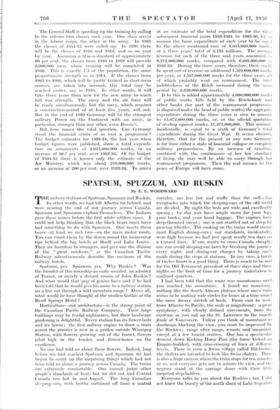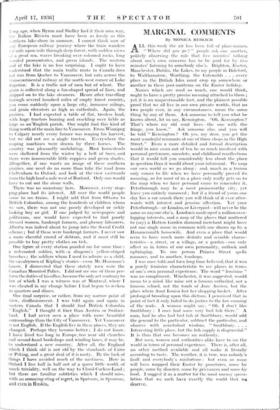SPATSUM, SPUZZUM, AND RUSKIN
By E. L. WOODWARD Spatsum, yes. Spuzzum, yes. Why Ruskin ? Was the founder of this township an early socialist, an admirer of Turner, or merely a distant cousin of John Ruskin ? And what would that prig of genius have said if he had been told that he would give his name to a railway station on a line cut through a wild mountain range ? Above all, what would he have thought of the swollen Gothic of the -Banff Springs Hotel ?
Horticulture—not architecture—is the strong point of the Canadian Pacific Railway Company. Their large buildings may be feudal nightmares, but their landscape gardening is delightful. Every station has its flower-beds and its lawns ; the first railway engine to draw a train across the prairies is now in a -garden outside Winnipeg Station, with flowers growing out of the funnel, flowers piled high in the tender, and flower-boxes on the crankcase.
No one had told us about these flowers. Indeed, long -before we had reached Spatsum and Spuzzum we had begun to count up the surprising things which had not been told us about a journey across Canada: The trains -are extremely comfortable. One cannot judge other people's standards of heat-, but we did not find Central Canada too hot in mid-August. The long Canadian sleeping-ears, with berths curtained off from a central corridor, are less hot and stuffy than the eoflin like receptacles into which the' sleeping-cars of the old world arc divided. By night the beds are wide and excellently sprung ; by day you have ample room for your legs, your books, and your hand luggage. Thee engines have deep-throated sirens ; one is not startled out of sleep by piercing whistles. The cooking on the trains would shame most English dining-cars ; our standards, incidentally, were high because we had just spent nearly ten days- on a Cunard liner. If one wants to cross Canada cheaply, one can avoid sleeping-car fares by breaking the journey every night, and dining-car charges by -taking one's meals during the stops at stations. In any ease, a break of twelve hours is a good thing. There is much to be said for the Old Testament precedent of three-days and three nights as the limit of time for a journey Undertaken in confined quarters.
• I had been told that the route was monotonous until you reached the mountains. I found no Monotony, nothing like the South African plateau where-one's train seems to be making wide circles for hours at a time round the same dreary stretch of bush. From east to west, from Atlantic to Pacific, the scale is magnificent; a great symphony, with - clearly defined movements, from the overture as you- sail up the St. Lawrence to the superb finale at Vancouver. Unless you think of mountains as dustheaps blocking the view, you must be impressed by the Rockies ; range after range, remote and unspoiled. except at a few tourist centres. One has a spectacular descent down Kicking- Horse Pass (the horse kicked an Empire-builder), with criss-crossing of lines at different levels. There is even a Swiss village called Edelweiss : the chalets are intended to look like Swiss chalet& Then. is also a huge canyon where the train stops for ten minute •• or so, and everyone gets out to admire the view, and the negroes stand at the carriage doors with their little carpeted step-ladders.
Everyone talks to you about the Rockies ; but I did not know the beauty of the north shore of Lake Superior. Long ago, when Byron and Shelley had it their own way, the Italian Riviera must have been as lovely as this northern lake-shore in summer. I cannot. think now of :Inv European railway journey where the train wanders for mile upon mile through deep forest, with sudden views of a great sea,. waves breaking over coloured rocks, long Wooded promontories, and green islands. The western end of the lake is no less surprising. I ought to have understood that the main traffic route in Canada does not run from Quebec to Vancouver, but cuts across the transcontinental railway at the north-west corner of Lake Superior. It. is a traffic not of men but of wheat. The grain is. collected along a fan-shaped spread of lines, and shipped on to the lake • steamers. Hence after travelling through several hundred miles of empty forest country, you come suddenly upon a large city, immense sidings, and grain elevators as high as cathedrals. Again, the prairies. -I had expected a table of fiat, treeless land, with huge :tractors buzzing and crackling over fields as large as an'English parish. One might find this kind of thing north of the main line to Vancouver. From Winnipeg to Calgary nearly every farmer was reaping his harvest, but we did not see a single tractor. Everywhere the reaping machines were drawn by three horses. The country • was pleasantly undulating.. Most homesteads were sheltered from the winter by a belt of trees, and there were innumerable little coppices and green shades. Altogether, if one wants an image of these southern prairies, one need do no more than take the road from Cheltenham to Oxford, and look at the view eastwards from the high land a mile west of Burford. Only one would have to cut out the stone walls.
There was no monotony here. Moreover, every stop- ping-place had its interest. All over the world people come to .see trains. I might add that from Ottawa to British Columbia, among the hundreds of children whom we saw, there was not one poorly developed or sickly looking boy: or, girl. If one-judged by newspapers and politicians, one would have expected to find poorly dressed women, bankrupt farmers, and gloomy labourers. Alberta was indeed. about to jump into the Social Credit scheme:; but if these were bankrupt farmers, I never saw a • more cheerful crowd of debtors, and it must still be possible to buy pretty clothes on tick.
One figure at every station puzzled me for sonic time : a red-coated soldier, with .a dragoon's yellow-striped breeches ; the soldiers whom I used to admire as a child, the cavalrymen of Kipling's stories—even Mr. Ilousman's lancer. I discovered that these stately men were the Canadian Mounted Police. I did not see one of them per- form the duties of his office, because the only act contrary to law of which I was a witness was at Montreal. where I was cheated in my change before I had begun to reckon in quarters and dimes.
One final surprise, or rather, from my narrow point of view, disillusionment. I was told again and again in eastern Canada that I should find British Columbia "English." . I thought it finer than Austria or Switzer- land. I had never seen a place with more beautiful surroundings-than the City of Vancouver.. Yet Vancouver is not English. If the English live in these places, they are changed. Perhaps they become better ; I do not know. I have lived too long in Europe, too near old churches and second-hand bookshops and winding lanes, it may be, to understand a new country. After all, the England which I think old is not old by the standards of Cairo or Peking, and a great deal of it is nasty. By the luck of things I have. avoided much of the nastiness. Here in Oxford I live half in half out of a queer little world, of much triviality, well on the way to Cloud-Cuckoo-Land ; but there are familiar subtleties which I should miss, with an annoying sting of regret, in Spatsum, in Spuzzum,
and even in Ruskin.













































 Previous page
Previous page